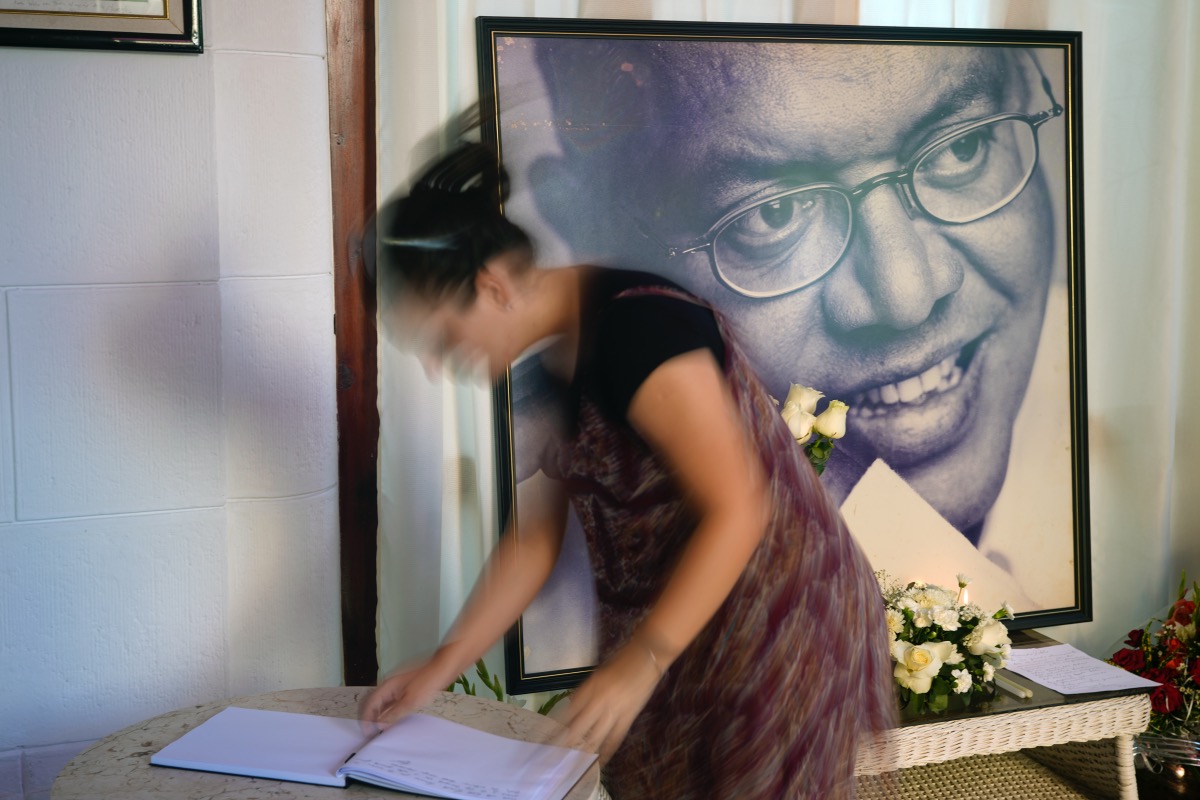

People sign a condolences book for the family of Pablo Milanés, whose photo hangs behind, in his family’s music studio, PM Records, in Havana, Cuba, Tuesday, November 22, 2022. Milanés, the Latin Grammy-winning balladeer who helped found Cuba’s “nueva trova” movement and toured the world as a cultural ambassador for Fidel Castro’s revolution, died on November 21 in Spain, where he had been under treatment for blood cancer. He was 79. (AP Photo/Ramon Espinosa)
SAN JUAN — Poet. Maestro. Cuba’s defiant son.
Pablo Milanés was all these things and more. He was also the soundtrack of my youth.
Milanés was born in Bayamo, Cuba, in 1943 and died of cancer in a hospital in Madrid, where he lived in voluntary exile, on November 22 at 79. The world mourned his passing, and I did too, in a personal way.
I was just weeks old when Fidel Castro entered Havana on January 9, 1959, riding in a jeep, an American M-2 slung over his shoulder. I grew up with the subsequent Bay of Pigs, the Cuban Missile Crisis, the Vietnam War —which led me to become a journalist— and the Cold War at its most virulent.
I saw men landing on the Moon, Woodstock, the Berlin Wall, and Mary Quant’s mini skirt. The civil rights movement in the United States ended in a litany of death —John F. Kennedy, Martin Luther King, Medgar Evers, Bobby Kennedy, Malcolm X— and the resurgence of the fight against Puerto Rico’s colonial status.
The ’60s was a decade of cultural and social change. It was one of hope. The soundtrack of that era, at least for me, was the songs of la nueva trova cubana and Milanés.
Milanés was one of the pioneers (along with fellow Cuban musician Silvio Rodriguez) of la nueva trova, which married Cuban son and guaracha with soul, jazz, and rock. It was a platform for the island’s dramatic social and political changes following the revolution.
He and the two other founders, Rodríguez and Noel Nicola, became the revolution’s troubadours. “The success of Silvio and Pablo is the success of the revolution,” Castro once said.
His instantly recognizable voice was as smooth as a drink of Havana Club rum. His songs were not only about social and political movements but also love. (Think of “El Breve Espacio en Donde No Esta.“)
So many of his songs play in my head as the soundtrack of those years: “Para Vivir,“ “Yolanda,” and “Son de Cuba a Puerto Rico.”
In the 1970s, right-wing authoritarian governments emerged in Latin America. As a result, songs like Milanés’ “Yo Pisare Las Calles Nuevamente“ became anthems of the left. (“Renacera mi pueblo de sus ruinas y pagaran su culpa los traidores.”)
Many of my generation believed in the words of the Puerto Rican poet Lola Rodríguez de Tío: “Cuba y Puerto Rico son de un pájaro las dos alas“—Cuba and Puerto Rico are the two wings of a bird. We saw Castro’s revolution as humanist, pregnant with social justice, Cuban as rice and black beans, as Caribbean as us—or so we thought.
It was a moment when the poems of Chilean poet Pablo Neruda and The Little Prince by Antoine de Saint-Exupéry became required reading. “And now here is my secret, a very simple secret: it is only with the heart that one sees rightly; what is essential is invisible to the eye.”
The revolution’s poetry, music, and literature made me a liberal. It drove my dearly departed father, Don Lorenzo Ramirez de Arellano, crazy. I can still hear him: “You are nothing but an air-conditioned socialist.”
And I was. I guess I was as much rebelling against him as I was against Puerto Rico’s colonial status.
I became a journalist, and the music of Milanés accompanied me to El Salvador, Nicaragua, Cuba, Puerto Rico, Mexico, Guatemala, and Sierra Leone. I would listen to it with mates no longer here —Ana Real, Miguel Gil Moreno de Mora, Marie Colvin— covering stories and killing fields that no one wants to discuss now.
With the passing of time and the entrenchment of the Cuban regime, Milanés could no longer sing to the revolution. He bacme one of its most famous critics. He later confessed that in 1965 he had been sent to a forced labor camp to re-educate him and artists the regime considered potentially subversive.
After more than 63 years, the failed U.S. embargo and the capitulation of an aging patriarch marked the end for me. As Cuba turned a corner, so did I. The once romantic perfume of the Cuban Revolution had turned acrid.
Castro’s revolution was a failed experiment, an oppressive regime that refused to release the chokehold it had on its people. Havana stands in decayed splendor, defiant in its struggle not to cave in, hiding the dirtiest of secrets.
And this is not much different from what is happening in Puerto Rico—“de un pájaro las dos alas.” I have seen my Cuban friends suffer under a less-than-ideal regime, as I see many of my fellow Boricuas suffering a similar fate today.
The memories of my coming-of-age envelop me with a tinge of sadness and nostalgia. As the English poet Philip Larkin wrote: “Never innocence again.” Or, in the words of an old Cuban combatant: “All these years for this?”
Yet the dream of freedom is still alive in the music of Milanés. To hear the first cords of “De Que Callada Manera“ brings it all back.
***
 Susanne Ramirez de Arellano is the former News Director for Univision Puerto Rico and a writer and journalist living in New York City. Comments can be sent to her email. Twitter: @DurgaOne
Susanne Ramirez de Arellano is the former News Director for Univision Puerto Rico and a writer and journalist living in New York City. Comments can be sent to her email. Twitter: @DurgaOne


